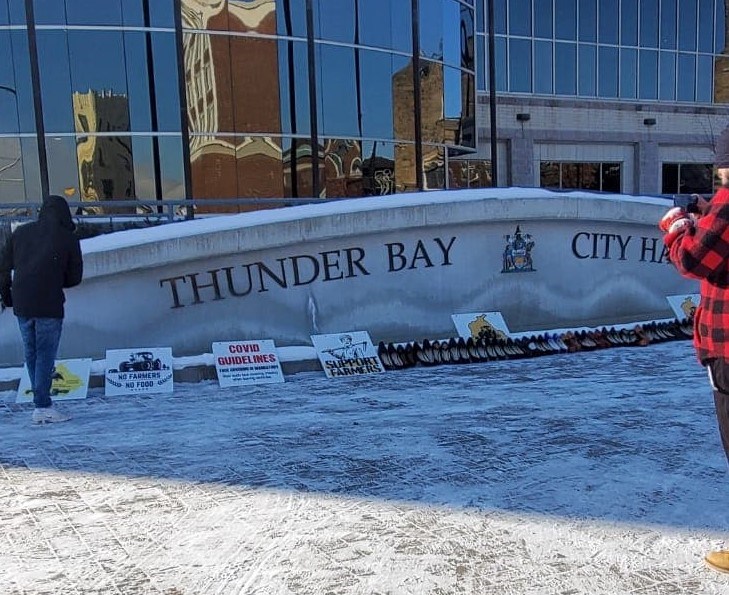THUNDER BAY – A group of Thunder Bay residents have joined national calls for a stronger response from Canadian leaders as the Indian government cracks down on widespread farmers protests in the country.
The group, most of whom have ties to India, staged a second local demonstration in support of the farmers at city hall on Saturday.
Organizers set out 200 pairs of shoes, representing those believed to have died or gone missing during the protests. Farmers unions have claimed at least 147 protesters have died from exposure to cold, suicide, accidents, and other causes.
At least one protester died, and hundreds were injured, in recent clashes with police.
Organizer Sukhraj Grewal, a Lakehead University student and president of its student union, said the real numbers are likely much higher.
“The shoes represent the many people that have lost their lives during the protests, the many people still missing and unaccounted for,” he said. “There are many pleas on social media from families completely heartbroken, just doing their best to find the whereabouts of their family members.”
Farmers and their supporters have been protesting for months against new agriculture laws that dismantled a government purchasing system, which had guaranteed farmers minimum prices for their crops.
The government of Indian Prime Minister Narendra Modi says the changes will encourage competition and investment.
Like many, Grewal sees the changes more cynically, saying they’ll leave farmers unprotected against large corporations.
“They’re going to affect the livelihoods of small farmers,” he said. “These controversial agricultural laws open up a gateway for private companies to exploit the market.”
Canadian leaders may not weigh in on the new laws, said Ramneek Singh, who also helped organize Saturday’s demonstration. However, he believes they have a moral obligation to speak out against the Indian government’s treatment of those protesting them.
The Modi government recently cut off internet in some areas around New Delhi, where tens of thousands of farmers have gathered, and has arrested several journalists for sedition over their coverage.
Meanwhile, police in some states have warned protestors could be barred from government jobs or denied passports, the New York Times reports.
Those who organized the Thunder Bay demonstration say they’re increasingly concerned about the safety of those back home.
Singh, a Lakehead alumnus who now lives in Vancouver, said similar actions across the country were aimed at raising the temperature on the Canadian response, which he said has been disappointingly mild.
India objected to a statement from Prime Minister Justin Trudeau in December expressing concern over the country’s response to the protests, warning such comments would “have a seriously damaging impact on ties” between the countries.
A government summary of a Feb. 10 call between Trudeau and Modi made only passing mention of the issue, saying the leaders had discussed protests and “the importance of resolving issues through dialogue.”
“There has been a response, [but] truthfully speaking, they’re just words,” said Grewal. “I believe some sort of action needs to be taken.”
The issue hits home for those in Canada who still have ties to India, he said. Aside from worries over the government’s response to the protest, he fears the farm reforms could affect Indians studying at Canadian universities and colleges.
“A lot of these [farmers] have sponsored their children to come abroad to learn and get settled in a safer environment,” he said. “With these laws being put forward, these people might not be able to support [them].”
He hopes actions like the one at city hall Saturday, as well as recent statements from public figures from Rihanna to Greta Thunberg, will spur other Canadians to learn about the issue and ask their representatives to speak up.
“The best thing we can do is bring awareness to this,” he said. “The government’s trying to create a media blackout – we need to amplify those voices.”
